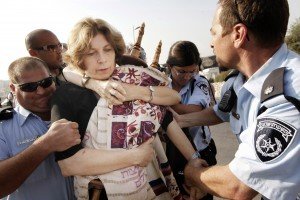For 30 years Women of the Wall have led the struggle for women’s right to pray at the Western Wall with tallit, tefillin and the Torah at the Western Wall.
In 1967, the keys to the Western Wall were handed to Orthodox religious governmental authorities, a partition was placed at the site to segregate men and women, and new rules began to be implemented regarding women’s prayer. Also in 1967, the Protection of Holy Places Law was voted in.
Since then, women’s prayer has been dictated by the “local custom” of the Western Wall, as defined by the Authority of the Western Wall and Holy Sites, appointed by the president and prime minister. As the rabbi appointed to this position is an ultra-Orthodox rabbi and also the head of the Western Wall Heritage foundation, he commands that women pray in complete silence, with no group prayer, no tallitot, and no Torah scrolls.
Women of the Wall began to pray together monthly at the Kotel in 1988. Women of the Wall spent over ten years, between 1989 and 2003, in the first Supreme Court struggle for women’s equal rights at the Western Wall. In the final decision, the Supreme Court instructed the government to build a prayer space in the Robinson’s Arch area, on the Southern end of the Western Wall. Courts later concluded that this was not done in accordance to the specifications. Read a full history.
Current Legal Status
On April 2013, after over 50 arrests and detentions of Women of the Wall at the Kotel, Judge Moshe Sobell wrote a breakthrough decision to Israel Police v. Lesley Sachs, Bonnie Riva Ras, Sylvie Rozenbaum, R. Valerie Stessin, & Sharona Kramer. Judge Sobel’s decision states: 1) WOW has not been violating the 2003 Supreme Court Decision regarding women’s prayer at the Kotel, 2) WOW did not violate the Law of Holy Places, in which visitors at the Kotel are to pray according to the “local custom,” 3) “Local custom” of the Kotel should to be interpreted with National and pluralistic implications, not solely Orthodox one, and 4) WOW did not endanger the public peace. Download the court decision.
The Struggle for the Torah
Unfortunately, Rabbi Shmuel Rabinowitz, Administrator of the Western Wall and Holy Places implemented regulations preventing women from accessing Torah scrolls at the Western Wall. There are 100 Torah scrolls for use by men at the Kotel, and Rabbi Shmuel Rabinowitz repeatedly REFUSES Women of the Wall’s requests for even one. Rabbi Rabinowitz has also banned all ‘outside’ Torah scrolls from being brought into the Kotel. This Catch-22 results in a discriminatory practice that keeps Torah scrolls out of the hands of women in a public, holy space in Israel.
The Western Wall has become the greatest symbol for the exclusion of women in the public sphere in Israel- grabbing national and international attention. The Administrator of the Western Wall, appointed by the Prime Minister and the Attorney General, must be held accountable for discriminatory regulations in a public space in Israel. Women of the Wall is engaged in a national and international campaign to lobby Israel’s leaders and the government to move towards change.
The Plan for a Pluralist Section at the Kotel
In keeping its responsibility to pursue all significant opportunities to realize WOW’s mission, the WOW board decided to enter into negotiations with the Prime Minister – through Avichai Mendelblit, Cabinet Secretary – for a third, pluralistic and equal section of the Western Wall. Unlike the current men’s and women’s sections, this section would not be administered by Rabbi Shmuel Rabinowitz. The pluralistic section would be fully integrated, equipped as a prayer space and would allow for both egalitarian and women’s prayer.
Photo by Miriam Alster/Flash90
